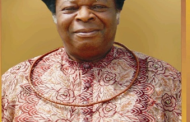Urban riots which kicked off peacefully last Monday have reached violent crescendo as for the government to clamp curfew on the country. Curfew is now running from 7 pm to 7 am unlike when it initially ran from 3 pm to the following day.

President Julius Mada Bio of Sierra Leone who is currently outside the country
Who exactly is behind is still a subject of contestation but it is the usual constellation of the urban poor, unemployed young men and women, workers and others on the fringe of what passes for the national economy in a typical African state.
Violence has been directed at symbols of the state such as the police, their offices and other government infrastructure, with the clarion call being for President Mada Bio to leave. The obvious assumption is an attack on the personification of state power in Sierra Leone. It is always the case even as the crisis often has causes far and beyond the typical African state. In this case though, high handedness of security operatives, human rights violation, flawed electoral reform and rising cost of living are being cited.
The riots itself is said to have been triggered by a clarion call articulated by a Sierra Leonean national who lives in Belgium. The subsequent actions have brought Freetown, Sierra Leone’s ancient capital city, to a standstill, with the government suggesting to a BBC interviewer it is being manipulated by opponents of the government. Wednesday, August 10th, 2022 has been the hottest day so far. Videos of violent scenes of killing are already circulating.

A riots profile of the African continent in 2019 by The Economist Intelligence Unit
At a time the West Africa sub-region is already tense from transferred consequences of COVID-19, generalized insecurity, ethnic tension, democratic deficits and rising cost of living, the plausible contagion effects of what is happening in Sierra Leone is not lost on critical observers. Informed actors are actually fearful it could trigger a West African equivalent of the Arab Spring because of the similarity of the conditions. As varied as local conditions are, the overarching manifestations of a world at war, (Global War on Terror since 2001, the Covid-19 ‘War’, the war in Ukraine and the great power game all going on consecutively almost.
The ‘African condition’ is defined most of the time not by internal realities but by transferred consequences of global crisis. The fears are thus said to make sense in view of the weakness in boldly working out novel inclusionary and productive dialogue in many African countries.
Although the Nigerian segment of the African elite is given credit for working out such models, (quota system, No victor, no vanquished’, federal character, zoning), it is notorious for observing such models in the breach, thereby preventing it from being a continental reference point and leader.
Many watchers of the African scene would be saddened by the violent turn in Sierra Leone because they would see it as evidence that the peace dividend from the authoritarian breakdown in the mid-1990s is yet to materialize. The temptation would be to ask why peace doesn’t follow conflict in a large part of the African continent.




























